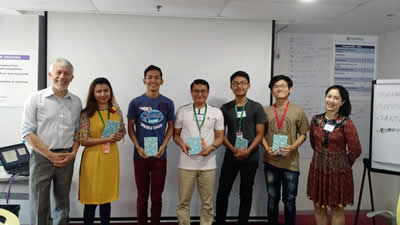Students, entrepreneurs and businesswomen were among the first graduates of an UNCTAD entrepreneurship training course held in Yangon, Myanmar, in partnership with the United Nations Development Programme (UNDP) and international telecommunications company Ooredoo from 15–20 December.
The course was a pilot with UNDP to assess the applicability of UNCTAD’s Empretec entrepreneurship training methodology in the rest of the country. The initiative comes as economic and democratic reforms undertaken in the last several years take root and Myanmar commits to strengthening its private sector.
Honey Mya Win, chief executive officer and co-founder of ChateSat.com, a website for freelancers in Myanmar, said attending the course was “a life-changing experience”.

“The methodology and the approach are really fantastic. After this workshop I can improve my business significantly,” she said.
Participant and freelance consultant Tun Lin Khaing said: “This workshop helped me to build up my business. I learned how to become a dynamic entrepreneur by learning to practice essential business competencies which are common for successful entrepreneurs. I want to become a lead entrepreneur in my research and training business.”
Phyo Thura Htay, a communications manager with Myanmar Innovative Life Sciences, added that the Empretec training had been “a mind-blowing experience”.
“It was demanding physically, emotionally and psychologically, but I am confident this learning will accelerate me to new heights.”
Rising economy
UNCTAD’s Tatiana Krylova said: “Myanmar’s nascent business scene has great potential to benefit from this initiative. In the 30 years since its launch in 1988, Empretec has continuously demonstrated high impact, positively affecting the efficiency, sustainability, and revenue generation and job creation opportunities for the entrepreneurs taking part.”
The six-day Empretec course marked the second collaboration between UNDP – which awarded $5,000 worth of in-kind start-up support to the best three business plans – and Ooredoo Myanmar after they signed an agreement in November 2018.
Winners and runners-up from a recent Hackathon event they organized with IMPACT HUB – a flourishing co-working space for innovators in Yangon – were among the entrepreneurs to take part.
The course is part of a comprehensive UNDP initiative to boost sustainable and inclusive growth in Myanmar by promoting entrepreneurship, job creation and social impact investment supporting women and young people.
“The UNDP is fully committed to supporting Myanmar in establishing a stable and strong private sector,” UNDP Country Director Peter Batchelor said at the close of the training event.
“We will continue to explore innovative approaches to developing and supporting entrepreneurs especially in the micro, small and medium-sized enterprise sector as these are essential components for any rising economy,” he added.
Vikram Sinha, Ooredoo Myanmar chief executive officer, said after the Hackathon in December: “Ooredoo Myanmar cares for communities and the people. We will continually try to support their hopes and aspirations. We are excited to see young entrepreneurs who understand the twin concepts of business and technology.”
The Empretec graduates also committed to creating an Empretec alumni group in Myanmar to strengthen private sector networks and share experiences.
Empretec, UNCTAD’s flagship capacity-building programme, focuses on developing countries and economies in transition. Besides promoting entrepreneurship and enhancing productive capacity, it also seeks to boost the international competitiveness of small companies.
Since its inception, Empretec has successfully trained more than 500,000 people through national centres in 40 countries, helping them to establish or expand businesses and create jobs.
Ooredoo Myanmar is a leading provider of telecommunication services in Myanmar with a customer base of more than 9 million people.


